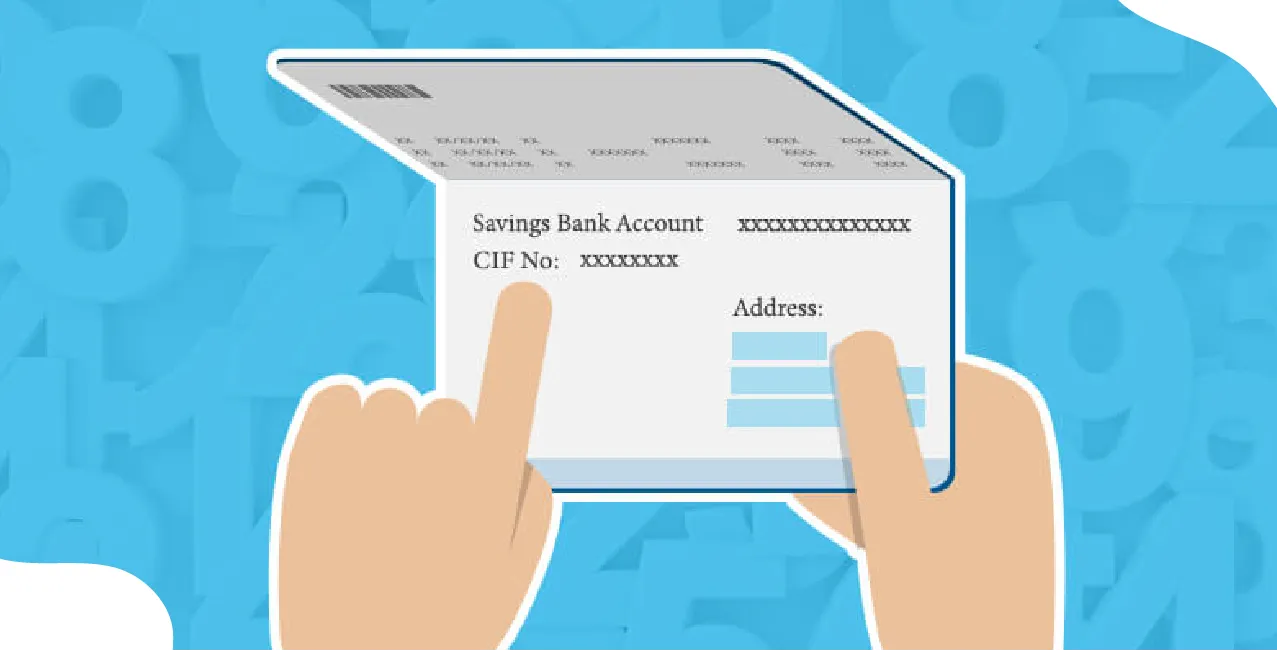What Is a CIF Number? Full Form, Use & How To Find It In a Bank Account?

Check Your Loan Eligibility Now
By continuing, you agree to LoansJagat's Credit Report Terms of Use, Terms and Conditions, Privacy Policy, and authorize contact via Call, SMS, Email, or WhatsApp
A CIF number is a distinct 11-digit code (like 98765432101). Banks use it to maintain and track each customer’s financial details and activities under a single file.
Suppose Shruti holds a savings account, a fixed deposit, and a home loan in the same bank. So, instead of maintaining three separate records, her bank links them using a single identification number.
That number is known as the Customer Information File (CIF) number. This number helps banks manage all data related to you effectively. Also, it allows the smooth delivery of various services.
This blog will walk you through the more details related to CIF number such as its uses and how to find it in a bank account.
Full Form Of CIF Number
It stands for Customer Information File. It is a unique file created for each customer by the bank. It helps consolidate all their account-related information (such as savings, loans, credit cards, and KYC details) under a single profile.
Banks use this file to efficiently track customer activity, offer personalised services, ensure compliance, and improve risk assessment.
This file includes the following:
- Full name and address
- Account numbers (savings, current, FD, loan, etc.)
- KYC records (PAN, Aadhaar, passport, etc.)
- Details of services like internet banking, debit cards, etc.
- Past transactions and balance history
- Creditworthiness and financial behaviour
Each bank assigns one CIF number per customer. Using this number, you can identify your overall banking profile, regardless of how many accounts you hold with that bank.
Read More – How to Know the CIF Number of SBI – Quick Methods Explained
Why Is The CIF Number Necessary?
The CIF number holds importance in almost every customer interaction with a bank.
1. Customer Recognition
You might have heard about the CIF number. Banks use this to retrieve all account and identity information quickly. They do not need to access each of your accounts separately. The bank staff can view your full profile using this code.
2. Linking Multiple Accounts
All types of accounts, such as savings, recurring, fixed deposits, credit cards, and loans, are grouped under one CIF. This helps banks offer services to you in a streamlined manner.
3. Centralised Operations
Whether you visit your home branch or a different branch, the staff can access your details through the CIF. It also supports online banking and ATM-based transactions.
4. Service Personalisation
Your all data is in one place. This helps banks assess your behaviour and offer services like pre-approved loans or customised investment suggestions.
5. Faster Loan Processing
When you apply for a loan, your CIF number helps the bank examine your account balance, repayment record, and credit standing.
6. Security and Fraud Detection
CIF numbers support internal bank systems in verifying user identity and tracing account misuse or suspicious activity.
The following are the details stored in a CIF file:
These details help the bank understand your financial relationship across services.
Where Can You Find Your CIF Number?
Your CIF number is accessible through several sources, both online and offline.
1. Bank Passbook
Most banks print the CIF number on the first or second page of the passbook. It is usually near the customer’s name or customer ID. However, the location of the CIF number may vary by bank.
For instance, at State Bank of India (SBI), you'll often find your CIF number conveniently located on the first page of your passbook.
However, with some private sector banks like HDFC Bank or ICICI Bank, the CIF may not be displayed on your passbook or chequebook at all. In such cases, you need to log in to their net banking portal or visit a branch to obtain this information.
2. Account Statement
Printed or emailed statements usually include the CIF number near the top, along with account and branch details.
3. Internet Banking
After logging into your online banking account, you need to go to Account Summary or Profile to view your CIF number.
4. Bank Mobile App
Under the app’s profile or account settings section, you can locate your CIF.
5. Chequebook
Some banks also print the CIF on the inside cover or first leaf of your chequebook.
6. Customer Service Helpline
If you still cannot locate the number, call your bank’s helpline. After identity verification, they will guide you to find your CIF.
Usually, you will be able to find your CIF number in the above-mentioned sources.
Difference Between CIF And Account Number
Many customers think CIF and account number are the same. But here’s how they differ.
- CIF Number: Identifies the customer.
- Account Number: Identifies a particular bank account.
You can see from the above-mentioned table that both numbers are related to banking, but their functions differ.
Real-World Examples Of CIF Use
In HDFC Bank, Manoj has:
- Savings account: ₹65,000
- Fixed deposit: ₹1,40,000
- Home loan: ₹5,50,000
- Recurring deposit: ₹60,000
- Car loan: ₹2,75,000
All of these are linked to CIF number 11012345678. When Manoj applies for a credit card, the bank doesn't ask him to resubmit his KYC documents.
Using his CIF, HDFC Bank quickly accesses his complete financial profile, verifies his identity, and processes the credit card application faster. This saves both time and paperwork.
Also Read - How to Find SBI Account Number – Quick Guide for Customers
Services That Require CIF Verification
Generally, you need a CIF number for the following services:
The above-mentioned table highlights where your CIF number is crucial, especially for personalised banking and digital services that require identity verification.
Conclusions
You might have understood by now that the CIF number works like a digital folder for you. A folder that contains your every important banking detail.
Whether it is a savings account, deposit, or loan, the bank can quickly trace and manage all your services using this number.
If you know where you can find your CIF number and when to use it, then it can help you save time, avoid errors, and keep your financial records in order.
FAQs
1. Can one person have more than one CIF number?
Only if they have accounts in separate regions or banks.
2. Is the CIF number the same as the customer ID?
In some banks, yes. In others, they are separate.
3. Will my CIF number change if I open another account?
No, it will remain the same in that bank.
4. Is the CIF number sensitive information?
Yes, it should be kept confidential.
5. Do I need CIF for internet banking setup?
Yes, many banks use it during the registration process.
Other Informative Pages | |||
About the author

LoansJagat Team
Contributor‘Simplify Finance for Everyone.’ This is the common goal of our team, as we try to explain any topic with relatable examples. From personal to business finance, managing EMIs to becoming debt-free, we do extensive research on each and every parameter, so you don’t have to. Scroll up and have a look at what 15+ years of experience in the BFSI sector looks like.
Subscribe Now
Related Blog Post

Salaried vs. Self-Employed: Who Gets a Personal Loan Faster in 2025?

Too Many EMIs? What to Do When Monthly Payments Become Unmanageable

Post Office Customer Care Number: Helpline & Support
Recent Blogs
All Topics
Contents
Quick Apply Loan
Consolidate your debts into one easy EMI.
Takes less than 2 minutes. No paperwork.
10 Lakhs+
Trusted Customers
2000 Cr+
Loans Disbursed
4.7/5
Google Reviews
20+
Banks & NBFCs Offers
Other services mentioned in this article





